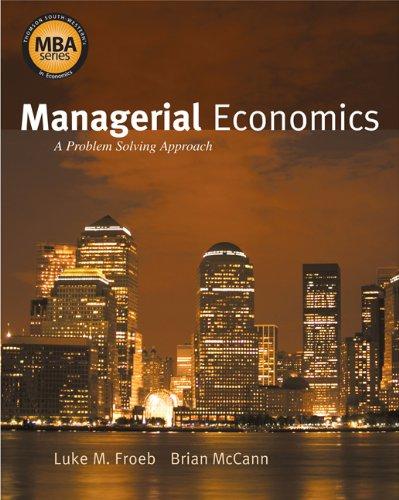Question
Marcus is a winemaker in ancient Rome. Each harvest, he buys grapes from the farmers outside Rome, and makes them into wine which he sells
Marcus is a winemaker in ancient Rome. Each harvest, he buys grapes from the farmers outside Rome, and makes them into wine which he sells at the market in Rome. There are many other vendors who compete with each other, and the plebians are used to buying wine for exactly 15 denarii (currency) per bottle. This price has never gone up or down as long as Marcus has been alive. The grapes that go into a bottle of wine cost 10 denarii in a normal year but fluctuate with each harvest.
The farmers outside Rome produce more grapes than usual in a good year causing prices to fall below their normal level, and less grapes than normal in a drought. Last summer, there was a major drought that led to a poor harvest, causing grape input prices to soar to 20 denarii per bottle, (as stated previously, wine prices always stay the same). Marcus almost went bankrupt and drained most of his savings since he couldn't buy any grapes to make wine. He is unsure of this year's harvest and seeks to protect himself from future price shocks.
That spring, he speaks to a farmer in the countryside to guarantee himself a predetermined price ahead of time. The farmer agrees to enter a contract with Marcus to sell him enough grapes to make his wine for the year. They agree ahead of time, so that the grapes will be locked in at a fixed price of 12 denarii. Assume neither Marcus nor the farmer can break out of the contract and must buy/sell the grapes from each other at agreed upon 12 denarii.
Questions
1. This year, there is another drought, and grape prices again go up to 20 denarii. Consider what happens to Marcus and the farmer in this case. Does anyone "win" in this agreement?
2. Consider the risk that Marcus has normally been taking by buying grapes at the market price after each harvest. How does this risk change when he enters into the contract? Consider the cases where grape prices rise, fall, or stay the same.
3. Now consider the risk the farmer normally takes when he produces and sells grapes at the market after each harvest. How does his risk change if he enters the contract with Marcus?
4. Does either Marcus or the farmer always "win" in this situation? Can there be any mutually beneficial contract for both parties?
5. Do you think entering into the contract with the farmer is a good idea for Marcus? What incentivizes Marcus and the farmer to enter into these contracts every year?
6. The farmer is deciding whether or not to sell none, some, or all of his usual grape harvest through these contracts. What tradeoffs does the farmer incur in each case and what do you think he should do?
Step by Step Solution
There are 3 Steps involved in it
Step: 1

Get Instant Access to Expert-Tailored Solutions
See step-by-step solutions with expert insights and AI powered tools for academic success
Step: 2

Step: 3

Ace Your Homework with AI
Get the answers you need in no time with our AI-driven, step-by-step assistance
Get Started


